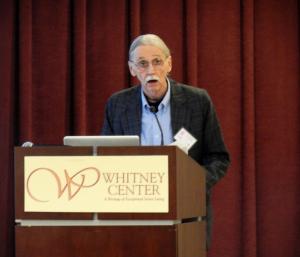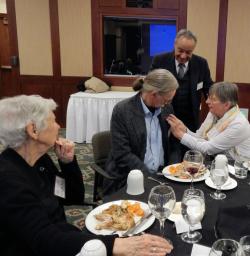Meeting Minutes 1454 November 9, 2016
Connecticut Academy of Arts and Sciences
Minutes of the CAAS 1454th Meeting
November 9, 2016
Whitney Center, Hamden, CT
 Minutes of CAAS Meeting 1454: Professor Vladimir Wozniuk, Professor Emeritus of Political Science, Western New England University.
Minutes of CAAS Meeting 1454: Professor Vladimir Wozniuk, Professor Emeritus of Political Science, Western New England University.
Gregory Tignor, President of CAAS, convened the meeting at 5:30 after a wine reception at 5 PM.
He announced the appointment of Hans Dam as the CAAS vice president for the University of Connecticut.
He also announced a tour of the three Yale University Theaters on December 14, at 1:30. He presented details of the tour that will be submitted to the CAAS membership. A reception will follow the tour at the Graduate Club on Elm Street in New Haven.
Tignor then introduced the guest speaker, Vladimir Wozniuk, a member of the CAAS council and Professor Emeritus of Political Science at Western New England University.
Professor Wozniuk gave a presentation to the membership and guests in attendance on the topic Resurgent Nationalism: Making Your Country Great Again?
An alternate title to the talk could have been “The Great Unraveling.”
Professor Wozniuk started by discussing the origins of the concept “United States of Europe” and the movement for European integration after World War II. He noted that the term goes farther back than that, at least to the middle of the nineteenth century and the Age of Nationalism, to Victor Hugo in his use of the term in 1849, as he looked beyond narrow nationalism and advocated a European “brotherhood.”
 Nationalism in politics can be dangerous, similar to inflation in economics: just as a little inflation in economics is good, a little nationalism in politics might be good, but extremes such as hyper-nationalism and hyperinflation must be avoided at all costs.
Nationalism in politics can be dangerous, similar to inflation in economics: just as a little inflation in economics is good, a little nationalism in politics might be good, but extremes such as hyper-nationalism and hyperinflation must be avoided at all costs.
The emotions and sentiments associated with nationalism are particularly susceptible to exploitation by those who want to assert a nation’s “exceptionalism.” And there are perhaps as many claims of exceptionalism as there are nations, a situation that inevitably risks clashes. As numerous examples in the nineteenth and twentieth centuries indicate, such clashes are not uncommon.
Now, in the twenty-first century the processes of political and economic integration that gave twentieth century form and structure to visions of cooperation not unlike Hugo’s are under fire.
So it is that we have the “Make America Great Again” campaign in the US and the British “Take Back Control” vote to leave the European Union (Brexit). And now similar movements in other countries are emboldened, with the leader of the far right in France claiming “the time of the nation state has come again.”
(To paraphrase the actress Betty Davis, “fasten your seat belts, because we’re in for a bumpy ride.”)
Angry and frustrated with elites, ordinary people who are worried about jobs and the future have responded to the siren song of nationalism. Politicians and voices of nationalism have presented integration and globalization as not only being against citizens’ personal interests, but against the national interest as well. As a result, it is possible that resurgent nationalisms couldbring to an end all the processes, institutions and agreements that go under under the rubrics of integration and globalization.
What is especially troubling about all this is that these voices seem oblivious to the reasons these processes, institutions and agreements came about in the first place.
The European Union, the World Trade Organization, and NAFTA, among others, are institutions that derive in one way or another from US-led efforts toward the end of WWII and just after in order to secure peace and prosperity – Bretton Woods, International Monetary Fund, the World Bank, GATT, Dollar/Gold/Exchange rates, the Marshall Plan, and later, NATO.
The war along with the factors that contributed to it – the cataclysm of the Great Depression and the extreme forms of nationalism that grew in that desperate economic climate – provided inspiration and a sense of urgency for these and other efforts to secure peace and prosperity.
Europeans soon undertook a project of their own – with the aim of creating a “United States of Europe.” The European Coal and Steel Community became the European Economic Community, which later became the European Union so familiar to us.
 All this was accomplished under the principle of peaceful gradualism. Serious political disruption was in fact avoided: no great depression, no global war such as WWII was repeated.
All this was accomplished under the principle of peaceful gradualism. Serious political disruption was in fact avoided: no great depression, no global war such as WWII was repeated.
Now the international system is paradoxically at risk of being rejected politically by nationalisms that promise a better future for nation-states wanting to go it alone.
It’s as though amnesia has set in as to how bad nationalism can get.
Yet it’s not as though the likelihood of negative reactions to globalization was not foreseen; it’s the intensity of the reactions that was not expected.
There’s a great paradox: “Globalization is bringing people closer apart and places further together.” [From James Rosenau, Distant Proximities (2003)]
Rosenau’s awkward term “Fragmegration” consolidates all the tensions around globalization; the contradictions facing an international system of nation-states that has become more fragmented as it has become more integrated.
But if nationalism has accelerated the process of fragmentation, not only may the international agreements and institutions mentioned earlier be threatened, but so may the nation-state system itself.
Two recent examples suggest that possibility: Russia’s annexation of Crimea and its support of separatism in eastern Ukraine; and China’s unilateral assertion of sovereignty in the South China Sea against the Philippines. These actions remind us that separatism and irredentism can lead to violence that may escalate into wider conflict.
Both the Russian and the Chinese actions are clear violations of international law, but have yet to be addressed effectively. As an indication of the depth of such problems, the Chinese vice premier dismissed the Law of the Sea Tribunal ruling against the Chinese last summer as “nothing but a scrap of paper.”
Moreover, Russian actions against Ukraine worry other former Soviet states, particularly Lithuania, Latvia, and Estonia, in effect putting them on high alert. These are NATO states, which should be of concern to all of us, because an attack on one means an attack on all.
Both the Russian and the Chinese leaders are pursuing goals on the basis of the exceptionalism idea presented earlier.
All the examples mentioned – Russia in Ukraine, China in the South China Sea, Brexit from the EU, as well as the “Make America Great Again” campaign (not to mention the potential for others) – suggest that fragmentation may be overtaking the processes of integration and globalization.
Imagine rising nationalism pushing an EU member like France to abandon the Euro currency. And with French and German elections looming next year, real concerns about spreading instability are now being raised.
Keeping all this in mind, nationalism may prove to be the worst possible approach to solving problems that are international in scope. Global problems require global solutions. When we add climate change and humanitarian problems to the discussion, it’s clear that we all sink or swim together.
 How will leaders of governments and non-governmental organizations respond? How will economic disparities be solved? How will the world deal with tens of millions who are left behind and enraged at the system? What’s to be done with all the poor left behind, or afraid of being left behind? How will workers be reassured?
How will leaders of governments and non-governmental organizations respond? How will economic disparities be solved? How will the world deal with tens of millions who are left behind and enraged at the system? What’s to be done with all the poor left behind, or afraid of being left behind? How will workers be reassured?
These are especially important questions at this time of transitions from fossil fuels to renewable energy and an industrial based global economy to one that is based on robotics and Artificial Intelligence. The pace of change now threatens to overtake us, perhaps more than ever before. Here we can refer back to Alvin Toffler’s Future Shock.
And lastly, one last question: if we have underestimated the power of resurgent nationalism, will we now overestimate the international system to withstand the next global economic crisis and emerge more or less intact?
In closing, it seems very unlikely that another such crisis will allow a meaningful take back of control or will make any country great again.
Questions and comments followed concerning economic inequality, evangelical Christianity, large corporate interests, threats to democracy, and the idea of a Universal Basic Income.
The meeting was adjourned for dinner at which time the speaker was presented with a CAAS pin symbolizing his membership.
Minutes recorded by Monica Aspianto and revised by Vladimir Wozniuk
Photos by Robert Green